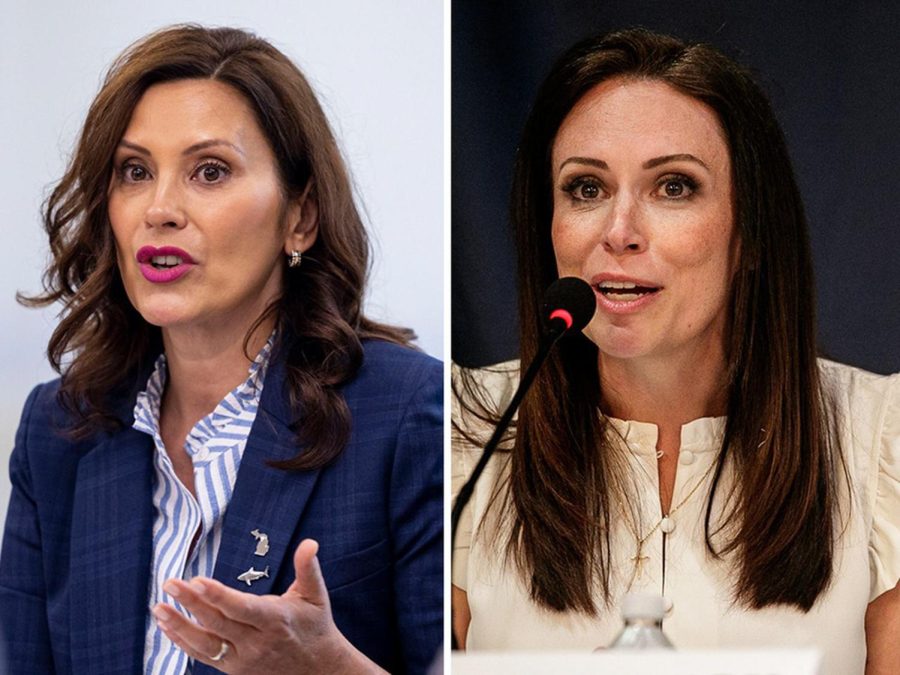Whitmer, Dixon participate in first gubernatorial debate in Grand Rapids
Oct 17, 2022
Just under a month away from the general election, Michigan gubernatorial candidates Gretchen Whitmer and Tudor Dixon participated in the first debate of the campaign hosted by WOOD TV8 in its Grand Rapids studio. The debate was a display of the candidates’ contrasting views on key issues including abortion rights, the economy and gun control.
The debate came as new statewide polls have indicated a tightening in the race. Where incumbent Democrat Governor Whitmer once consistently led Republican challenger Dixon by double digits, new polling from CBS News/YouGov and Lansing-based EPIC-MRA have shown Whitmer’s lead narrowing to just six points and 11 points, respectively. With divisive issues on the ballot and juxtaposing viewpoints expressed in the debate, voters are determining what candidate they see as the best leader for Michigan’s future.
One of the central issues in the upcoming Michigan election is abortion rights and regulations. After the U.S. Supreme Court’s decision in June to overturn the nationwide right to abortion, access to the procedure and the future of its legality have come to the forefront of politics and the election.
Lawsuits by Whitmer and Planned Parenthood have prevented the state’s 1931 abortion ban, which offers no exceptions for abortion and would punish those who perform them with up to four years in prison, from going into effect.
Whitmer expressed during the debate that she advocates for choice for women and said if the 1931 ban is ruled unconstitutional, Michigan’s abortion laws will stand as is.
During the debate and throughout the campaign season, Dixon has expressed an opposing view. During the debate, she said she believes abortion should only be allowed to protect the “life of the mother,” but made no mention of exceptions for rape or incest. Additionally, she has previously called the 1931 ban a “good bill” at a Republican debate in Livingston County, starkly contrasting the stance of the current governor.
However, with Proposal 3 on the November ballot, voters will decide whether to codify abortion access into the state constitution. Dixon said that she would “accept the will of the people” following whatever decision is made on Proposal 3.
During the debate, Dixon continued a pattern of attempting to place distance between her own race and the issue of abortion, which has proven to be an energizing issue for Democrats as Proposal 3 has garnered significant levels of support in recent polls. In doing so, Dixon denied that there is influence by the governor on abortion.
“I understand that this is going to be decided by the people of the state of Michigan or by a judge,” Dixon said. “Please understand that the governor does not have the choice to go around a judge or a constitutional amendment.”
This comment was met by skepticism from Whitmer during the debate who commented about Dixon’s refusal to accept the 2020 election results.
“I think it’s really ironic when Mrs. Dixon stands here and says that she’ll accept ‘the will of the people,’” Whitmer said. “This is a candidate who still denies the outcome of the 2020 election, this is a candidate that will not pledge to accept the outcome of the Nov. 8 election. [This] tells me that we cannot trust what she’s saying.”
Similarly, voters are skeptical of what future abortion rights have in Michigan if Dixon is elected – regardless of whether Proposal 3 is passed.
Grand Valley State University senior Emily Kewel said she is concerned for the future of the state of Michigan.
“Tudor Dixon has made it very well known in her candidacy that she will not allow for legislation that protects abortion, even in special cases of rape and incest,” Kewel said. “She’s the absolute last option of someone I would want to see in office, as she allows her personal beliefs to flood into what is best for our state as a whole. Additionally, I do not believe that Dixon would accept the will of the people, especially with her history of working with Donald Trump.”
However, some Dixon supporters take her word from the debate in regard to abortion. GVSU senior Micheal Derpilibosian has supported Dixon in her run for governor, voted for her in the primaries and aligns himself in similar beliefs.
“I think she will do whatever voters want her to do with (the voting results of) Prop 3, as she mentioned,” Derpilibosian said. “I believe in pro-life with exceptions for life of the mother, incest and rape and it should be legal under those conditions.”
Other issues that were presented surrounded Michigan’s economy, primarily following COVID-19 pandemic shutdowns. Dixon made accusations that Michigan has had one of the slowest recoveries from COVID-19 with high unemployment rates and businesses closed.
Whitmer both defended her response to COVID-19 while recognizing that different choices could have been made.
“If I could go back in time with the knowledge we know now, sure I would’ve made some different decisions, but we were working in a crisis and lives were on the line,” Whitmer said.
The Dixon campaign and supporters have since sought to capitalize on the governor’s handling of the pandemic, believing that her actions caused unnecessary damage to local businesses and the statewide economy
“For instance, I was quite disappointed in how Governor Whitmer handled the COVID lockdowns and shut our beautiful state down and thousands of restaurants perished and were left behind after the pandemic,” Derpilibosian said. “So, keeping our state free is on my mind when I am voting this year.”
However, Whitmer said Michigan has seen job growth with industry and manufacturing jobs noting automotive companies such as GM and Ford expanding in Michigan and other manufacturing companies in the state.
Gun control laws were also contested in the debate. Governor Whitmer advocated for preventative legislation and gun control to help ensure safety including red-flag laws and secure storage laws. The attention to gun violence is something that Whitmer’s supporters see as an important issue in this election.
“The safety of others, especially from something we can control like weapons, should be a top priority always,” Kewel said.
In contrast, Dixon said in the debate that Whitmer’s stance on gun laws is “dangerous.” Dixon herself is an advocate for constitutional carry laws which allows people to purchase and carry guns without a permit and expressed the need for guns in schools as a way to curb mass shootings, saying that this would make it so that someone can “shoot down a shooter, shoot down a threat.”
These issues along with many others are in the hands of voters as the general election on Nov. 8 approaches and early voting begins through absentee ballots.























